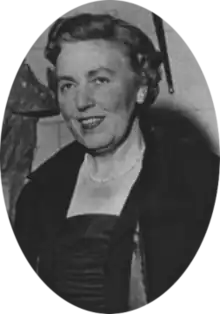Eleanor Butler, Lady Wicklow
Eleanor Butler (7 September 1914 – 21 February 1997),[1] also known as Lady (Countess of) Wicklow, was an Irish Labour Party politician and architect.
Eleanor Butler | |
|---|---|
 | |
| Senator | |
| In office April 1948 – July 1951 | |
| Constituency | Nominated by the Taoiseach |
| Personal details | |
| Born | Eleanor Grace Butler 7 September 1914 |
| Died | 21 February 1997 (aged 82) Blackrock, Dublin |
| Nationality | Irish |
| Political party | Labour Party |
| Spouse | William Howard, 8th Earl of Wicklow |
| Alma mater | University College Dublin |
Background
Butler was born on 7 September 1914, the daughter of Rudolph M. Butler, who was the first Professor of Architecture in University College Dublin.[2] Butler had a polio attack at age six, and shortly after achieving a bachelor's degree in architecture from University College Dublin at age 24 in 1938, had a riding accident that required a year of care in St Vincent's Hospital. Both incidents almost left her without the ability to walk. On the second occasion, she resolved that if she kept her ability to walk that she would try to lead a life of service to others.[1] Her father's influence also pushed her towards public life; early in her life, despite being a Protestant family, he pushed her to base her morality on Catholic social teaching such as social justice.[1] Later in life she converted to Roman Catholicism, as well as marrying a convert to Catholicism.[3]
Political career
She became a Labour member of Dublin Corporation, and was chosen by the party in 1945 to visit Britain to investigate modern British housing. She ran as a Labour candidate for the Dáil in 1948, before she was nominated by the Taoiseach to Seanad Éireann in April 1948, where she served until 1951.[4] On 2 September 1959 she married William Howard, 8th Earl of Wicklow, cementing a thirteen-year long courtship.[5][6]
Lady Wicklow was attached to the Moral Re-Armament movement, and in the 1970s became deeply concerned about The Troubles in Northern Ireland. Under her leadership, 20 women's organisations in the Republic of Ireland formed together to lobby on behalf of peace in Northern Ireland, eventually creating groups such as the Southern Movement for Peace and Co-operation North: the Ireland Fund of America.[7]
References
- "BUTLER, ELEANOR GRACE". dia.ie. Dictionary of Irish Architects. Retrieved 12 August 2019.
- "Eleanor, Countess of Wicklow". The Irish Times. 3 March 1997. Retrieved 21 March 2009.
- Bunbury, Turtle. "HOWARD OF SHELTON ABBEY - THE EARLS OF WICKLOW". turtlebunbury.com. Retrieved 12 August 2019.
In September 1959, Billy concluded a thirteen-year courtship with Eleanor.
- "Eleanor Butler". Oireachtas Members Database. Retrieved 21 March 2009.
- "Earls of Wicklow". Archived from the original on 29 February 2008. Retrieved 20 March 2009.
- Bunbury, Turtle. "HOWARD OF SHELTON ABBEY - THE EARLS OF WICKLOW". turtlebunbury.com. Retrieved 12 August 2019.
The woman in question was Eleanor Butler, a determined Roman Catholic with a formidable track record in Irish political circles.
- "Eleanor, Countess of Wicklow". Irish Times. 12 March 1997. Retrieved 12 August 2019.